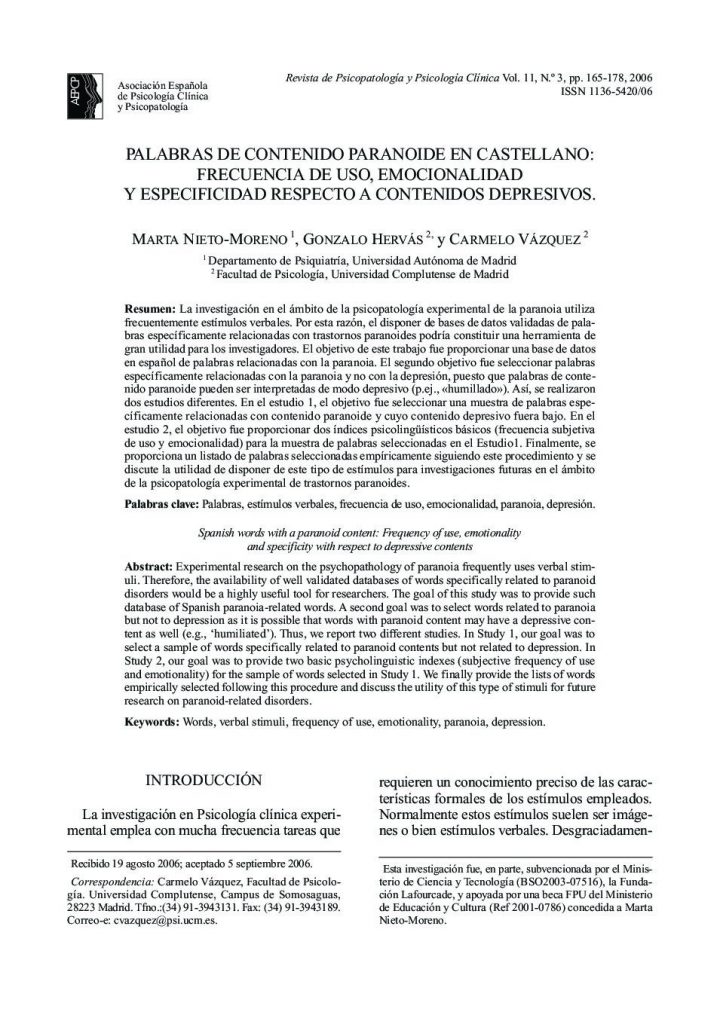Palabras de contenido paranoide en castellano: Frecuencia de uso, emocionalidad y especifi-cidad respecto a contenidos depresivos.
Palabras de contenido paranoide en castellano: Frecuencia de uso, emocionalidad y especifi-cidad respecto a contenidos depresivos.

- Resiliencia: Definición, características y utilidad del concepto.
- La estructura cognitiva de los trastornos de personalidad de evitación y dependiente: Un es-tudio con la técnica de rejilla.
- Burnout, expectativas de control y afrontamiento en un grupo de funcionarios de prisiones.
- Palabras de contenido paranoide en castellano: Frecuencia de uso, emocionalidad y especifi-cidad respecto a contenidos depresivos.
- Sucesos vitales estresantes y trastorno de pánico: Relación con el inicio del trastorno, la grave-dad clínica y la agorafobia.
- Información sobre criterios de calidad de la Revista de Psicopatología y Psicología Clínica
Experimental research on the psychopathology of paranoia frequently uses verbal stimuli. Therefore, the availability of well validated databases of words specifically related to paranoid disorders would be a highly useful tool for researchers. The goal of this study was to provide such database of Spanish paranoia-related words. A second goal was to select words related to paranoia but not to depression as it is possible that words with paranoid content may have a depressive content as well (e.g., ‘humili-ated’). Thus, we report two different studies. In Study 1, our goal was to select a sample of words spe-cifically related to paranoid contents but not related to depression. In Study 2, our goal was to provide two basic psycholinguistic indexes (subjective frequency of use and emotionality) for the sample of words selected in Study 1. We finally provide the lists of words empirically selected following this pro-cedure and discuss the utility of this type of stimuli for future research on paranoid-related disorders.
La investigación en el ámbito de la psicopatología experimental de la paranoia utiliza frecuentemente estímulos verbales. Por esta razón, el disponer de bases de datos validadas de palabras específica-mente relacionadas con trastornos paranoides podría constituir una herramienta de gran utilidad para los investigadores. El objetivo de este trabajo fue proporcionar una base de datos en español de pa-labras relacionadas con la paranoia. El segundo objetivo fue seleccionar palabras específicamente relacionadas con la paranoia y no con la depresión, puesto que palabras de contenido paranoide pueden ser interpretadas de modo depresivo (p.ej., “humillado”). Así, se realizaron dos estudios dife-rentes. En el estudio 1, el objetivo fue seleccionar una muestra de palabras específicamente relacio-nadas con contenido paranoide y cuyo contenido depresivo fuera bajo. En el estudio 2, el objetivo fue proporcionar dos índices psicolingüísticos básicos (frecuencia subjetiva de uso y emocionalidad) para la muestra de palabras seleccionadas en el Estudio1. Finalmente, se proporciona un listado de pala-bras seleccionadas empíricamente siguiendo este procedimiento y se discute la utilidad de disponer de este tipo de estímulos para investigaciones futuras en el ámbito de la psicopatología experimental de trastornos paranoides.



